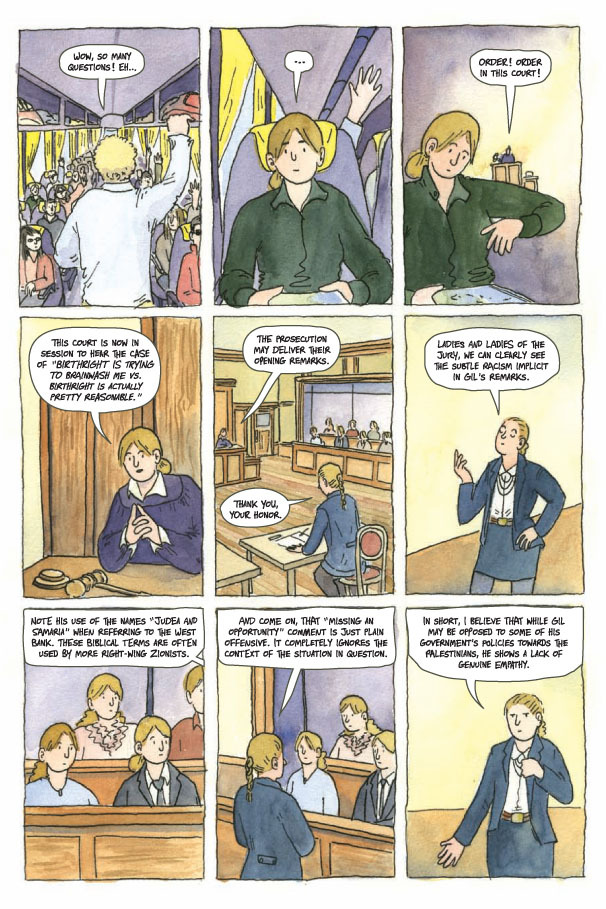 |
No. I’m not. Never.
We hear these words everyday.
Similarly, in her debut graphic novel, Sarah Glidden is asked: “It's a free trip, why wouldn’t you want to go?" For the young author of How to Understand Israel in 60 Days or Less, this was a question she struggled with for her entire life: whether or not she wanted to experience a birthright trip to Israel. The trip, for Sarah, meant more than just experiencing the Jewish culture that she felt a disconnect with. It was the threshold between black-and-white that would put her right in the middle of the “Religious Nationalist Conversations” surrounding the Israeli-Palestinian conflict. In the end however, Sarah was convinced: how could one refuse a free trip?
And so, Sarah embarked on a trip with a preconceived notion in mind. Sarah would not be the traditional Jew that advocated for the Israelis, who in her mind unrightfully took Palestinian land to achieve a religious prerogative. She was going to prove the doubters wrong. Jumping on the plane to Israel with her ‘American’ friend Melissa, Sarah was ready to interact with the war firsthand. However, when she came to Israel, hopping aboard the bus she was met with two conflicting sides that she struggled to come to terms with: Israel and Palestine.
Interacting with her tour guide Gil, Sarah was convinced the birthright trip was an excuse for advocating for the Israeli agenda, and she introduced herself with interjections of her bias: “Hi. I’m Sarah and I’m here because I’ve always been interested in the history and politics of Israel [Pualestine], and I wanted to, uh, [pass judgement on it] see it firsthand." Sarah’s fixed mindset against Israel hindered her from fully accepting the information presented on the birthright tour. While her friend Melissa was able to experience the novel information, Sarah and her background knowledge, played a part in all of the trip activities, such as when the tour was shown a clip of the wonders of Golan Heights taken by the Israelis from the Syrians: “And now… Syria wants it back. Israel has tried to compromise with the Syrian government, but Syria won’t budge. They want it all!” says Glidden.
 |
| Sarah's internal debate of her tour guide's information. |
At the start of the book, Sarah is a prototypical progressive American Jew. She's outspoken about her anti-Zionist views and is eager to prove that one can be both pro-Palestine and Jewish. However as the tour progresses, Sarah struggles to mediate the expectations put upon her as a Jew and the conflict in Israel and Palestine, where she says “I’m Jewish so that means I’m supposed to support Israel no matter what, right? But according to a lot of people, any support for the Palestinians means they don’t support Israel." While Sarah came into the tour expecting the information to confirm her beliefs, she quickly finds that the climate in Israel is not entirely as it seems. Sarah’s bias against the Israel, and not wanting to fit the Jewish archetype, puts her on a footing that quickly begins to shift as the story progresses making Sarah uneasy: “I don’t know. You’re gonna think I’m crazy. I just thought I knew what I felt about this place wand now I’m all messed up."
However, at the end of the day, Sarah learns to accept this uneasiness and realize that it’s okay if everything isn’t clear cut. The conflict is mediated by both Palestinians and Israelis, and the best solution is to not label individuals as one or the other, regardless of religious affiliation. Sarah listens to Rabbi Hartman: “The difference between Jew and Non- Jew does not exist. We are all members of the human condition. If you are a religious Jew, a doctor, on seeing a Palestinian injured on the side of the road, you should not have to think to help him." Here, Sarah realizes that there is a peace in not knowing and that at the end of the day she does not need to conform to the stereotypes that are laid before her. Instead, she chooses her own path in life and can form her own opinions independent of the environment and stereotypes around her.
At the end of the day, it’s perfectly human and normal to say:
“Maybe. I’m not sure. It’s complicated.”
-Aryan Walia, Sonya Gupta, Maddi Swanagan, Ari Li, Peyton Shafer
1 comment:
You provide a wonderfully detailed and accurate synopsis of Glidden's comic. Along the way, you also lend insight into the Israeli-Palestinian conflict. Without the image of a sample page from the book, readers might not know it's a comic, though. What do you have to say about this work as a graphic novel? Moreover, I couldn't help but wonder whether you enjoyed what you read. What did you like? What would you want to see more of or less of?
Post a Comment